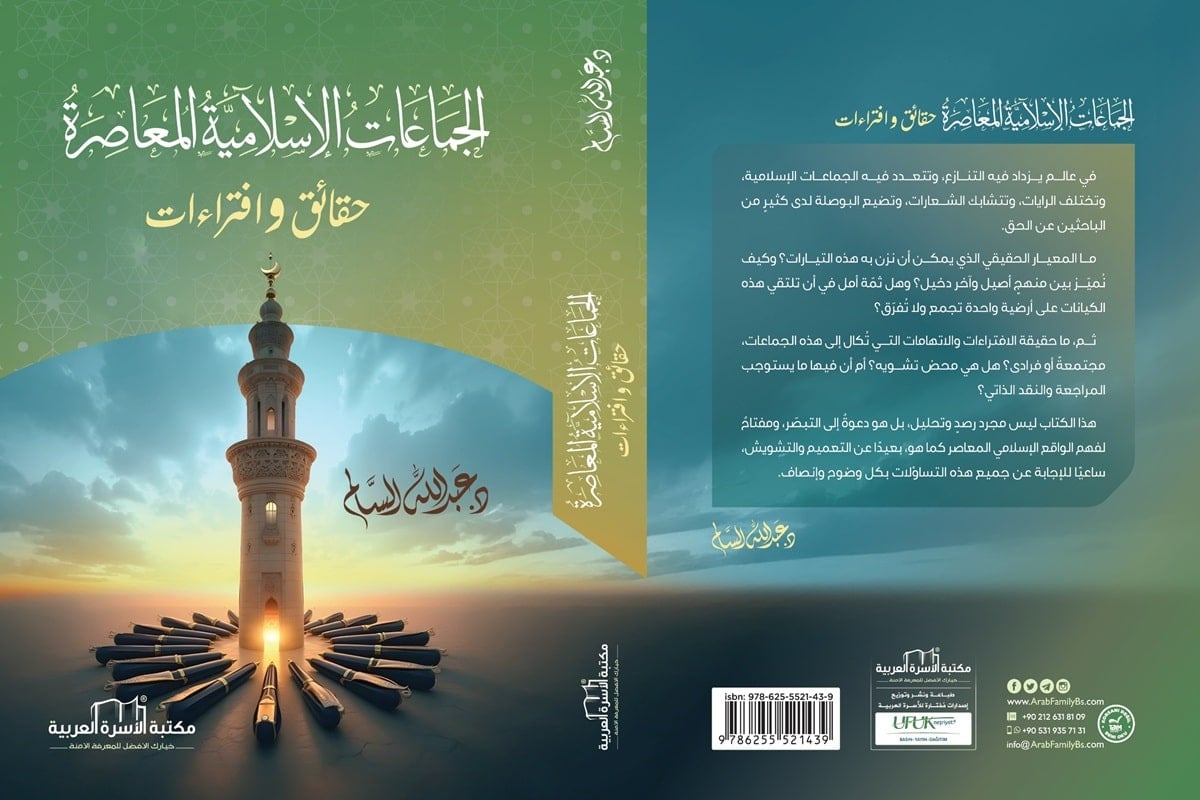
The Concept of Fundamentalism
Fundamentalism is a widely condemned term in our modern age, and it is most often used to refer to Islamic fundamentalism.
The term “fundamentalism” originates from the modern Western context (Fundamentalism) and originally refers to a Protestant Christian sect that believes in the literal inerrancy of every word in the “Holy Bible.” Its adherents claim direct revelation from God, oppose rational thought, scientific reasoning, and natural human development, and tend toward the use of force and violence to impose their corrupt beliefs[1].
This distorted portrayal is what many seek to project onto Islamic fundamentalism through various synonymous terms such as extremism, fanaticism, rigidity, radicalism, and others.
Islamic thought, however, has never known the term “fundamentalism” in this derogatory sense. Muslims only associate the term with the foundational disciplines of religion: the fundamentals of faith (uṣūl al-dīn), the fundamentals of ḥadīth, and the fundamentals of jurisprudence (uṣūl al-fiqh). Within the Islamic scholarly tradition, the term “fundamentalists” refers exclusively to scholars of uṣūl al-fiqh.
Hence, a closer examination of what is meant by “Islamic fundamentalism” in Western writings and contemporary media reveals that it merely refers to steadfastness in adhering to Islamic foundations—in belief, thought, politics, and daily life. And this, precisely, is the “accusation.”
According to this worldview, the Muslim must abandon his foundational principles and religious constants because they allegedly conflict with Western secular politics and culture or contradict contemporary customs and developments. Otherwise, he will be labeled a fundamentalist. In short, he must either forsake religion altogether or at least be extremely lenient in its application.
Levels of Renewal
In light of the aforementioned understanding of fundamentalism, the degree of criticism against it—and subsequently the call for renewal—varies across seven levels:
1. Renewing Juristic Reasoning (Ijtihād)
Here, the call for renewal means reviving disciplined ijtihād in jurisprudence, thought, and all branches of Islamic law, rejecting blind sectarian imitation, and purging the Sharia of superstitions and innovations. This is an indisputable obligation. A group of distinguished scholars from the later Islamic centuries championed this cause—among them: Shah Waliullah al-Dihlawi (1703–1762) in India, Muhammad ibn Ali al-Shawkani (1760–1834) in Yemen, and Abu al-Thana al-Alusi (1802–1854) in Iraq.
2. Renewal in Applied Jurisprudence (Fiqh al-Nawāzil)
This level pertains to addressing novel legal issues across various domains of life, using legitimate foundational principles and aiming for benefit as defined by Sharia. This is a reasonable and acceptable approach—indeed, a necessary one.
3. Renewal of the Foundations of Jurisprudence
This is a sensitive and controversial endeavor that can only be undertaken by eminent and upright scholars. Interfering with the foundational principles of any discipline is fraught with danger; even minor adjustments can impact the entire structure or lead to its collapse. Malicious actors may exploit such openings to launch subversive attacks on Islam.
If a new scholarly theory in uṣūl al-fiqh emerges—clearly identifying the renewed, annulled, or added principles, the necessity compelling this renewal, and the flawed methodology behind the old principles—and it clarifies the derivative rulings affected, and whether they align with fixed Sharia texts, then such efforts are commendable.
However, open-ended calls to “reform uṣūl al-fiqh according to the spirit of the 21st century” must be met with caution.
If the true aim of such reforms is to introduce new principles without any legitimate textual backing—relying solely on abstract “benefit,” submission to modern realities, or accommodation of modern materialistic norms that contradict Islamic rulings—then this constitutes a deviation from Islamic legal foundations toward subjective human whims.
4. Renewal in the Authority of the Sunnah
This level involves rejecting solitary narrations (khabar al-āḥād) and weakening even rigorously authenticated ḥadīths simply because they conflict with personal taste, custom, rationality, or modern scientific theories—or even lesser constructs, such as modern political, economic, or sociological paradigms. Such an approach is manifestly flawed.
5. Denial of the Authority of the Sunnah
Here, the Qur’an alone is deemed sufficient as a source of Islamic law. This suspicious intellectual trend began in the Indian subcontinent, spearheaded by the British collaborator Sir Sayyid Ahmad Khan (1817–1898). One of his contemporaries, an admirer, remarked: “If you read his works, you would see that he was a man of great intellect but little knowledge—and, God forgive him, he was also lax in practice, rarely praying or fasting.”[2]
This notion gradually spread in parts of the Muslim world, and its adherents came to be known as “Qur’anists.” Many scholars stood in opposition to them.
6. Renewal in Qur’anic Interpretation
This involves interpreting the Qur’an in ways that are completely disconnected from the semantic boundaries of the Arabic language, as practiced by Ahmad Khan and his followers. This is not renewal—it is alteration and distortion of religion.
7. Rejection of Fundamentalism
This is now the prevailing position of most modern media, following decades of obsessive critique of “fundamentalism” in Western writings and among their disciples in the Arab and Muslim worlds. Fundamentalism has come to mean mere visible religiosity or adherence to the five pillars of Islam.
Richard Hrair Dekmejian wrote:
“The Takfir group and Hizb al-Tahrir, along with Hasan al-Banna and Sayyid Qutb—symbols of the Muslim Brotherhood—all share fundamentalist principles in their extreme form. They advocate for adherence to the Five Pillars of Islam as the bare minimum. Moreover, the righteous Muslim is expected to join others in creating a virtuous society, as envisioned by the Qur’an and Sunnah. Consequently, the Egyptian regime is viewed as corrupt, subservient to the West, Israel, and the Soviet Union.”[3]
This, according to Professor Dekmejian—renowned political science scholar and frequent consultant to U.S. agencies and foreign governments—is the image of the “extremist Muslim fundamentalist” widely propagated in major media outlets.
Motivations for Renewal
As we can see, these calls for renewal vary widely. Some stem from sincere and well-meaning individuals who seek to ensure the continuity and universality of Islamic law. Others come from malicious actors aiming to dismantle Islam—either from within by means of reform and alteration, or from outside through distortion and incitement.
Sometimes such calls are driven by the need to resolve contemporary jurisprudential dilemmas resulting from necessity, public hardship, or shifting customs and standards due to the transformations of industrial modernity.
In other cases, the aim is merely to conform to the norms, theories, and political correctness of the modern age—including in moral values, metaphysical beliefs about God and the cosmos, and the adoption of these as authoritative over divine law, thereby necessitating its reform under the guise of renewal, coexistence, modernity, or science.
Topics and Figures of Renewal
One of the most prominent issues that some Muslims feel embarrassed about is the topic of women’s rights, particularly as they conflict with modern human rights discourse and gender equality culture. Many consider adherence to traditional Islamic rulings regarding women to be a form of fundamentalism, rigidity, or extremism in need of reform.
Qasim Amin called for women’s emancipation and the abolition of the hijab. Hassan al-Turabi advocated for reforming laws on inheritance and testimony. Ghazali Harb proposed equal distribution of household authority and the prohibition of polygamy.
Notably, figures of Orientalism, Christian missionary efforts, and colonial leadership in the Muslim world during the past two centuries have shown great enthusiasm for such renewal movements. They praised and supported these figures, portraying them as enlightened reformers and encouraging them to continue “renewing Islam”—the same Islam they sought to suppress and dominate.
For instance, Lord Cromer (1841–1917), British colonial administrator of Egypt, praised his friend Sheikh Muhammad Abduh for his rationalist tendencies and declared that he adhered to agnosticism, likening him to Sayyid Ahmad Khan of India—whom he also admired. Cromer claimed Abduh was the ideal candidate for the British project of Egyptian independence and that the British pressured the Khedive to pardon and appoint him as a judge[4]. What was the British interest in all this?

Fundamentalism and Extremism
The terms “fundamentalism” and “extremism” are often used interchangeably, along with “fanaticism,” “rigidity,” “violence,” and “terrorism.”
Extremism, by definition, denotes deviation from balance and moderation, veering to one extreme. In its general usage, it is akin to religious excess (ghulūw), which is explicitly condemned in Islam.
Allah says:
“O People of the Book, do not exaggerate in your religion…” (Qur’an 4:171).
The Prophet ﷺ said: “The extremists have perished,” and “Beware of exaggeration.” Therefore, conflating fundamentalism with extremism in the sense of ghulūw is unacceptable.
Legitimate Extremism
Nonetheless, even the term “extremism”—synonymous in Islamic discourse with ghulūw and tanatṭuʿ—has been subject to manipulation and distortion. Much of what the Western and Arab media today condemn as “extremism” is, in fact, justified—on two grounds:
First, extremism normally means an unjustifiable extreme. But in today’s abnormal and unjust world—particularly amid Muslim oppression—those labeled extremists are often just ordinary people defending their basic rights: life, safety, and homeland. Their “extremism” is a compelled reaction, not a chosen ideology. Even animals defend themselves when threatened.
Dutch Orientalist Professor Johannes Jansen writes:
“If you are a fundamentalist in the Arab world, then the use of force may appear to be the only logical option to express your opinion; for there are very few peaceful means of doing so. You cannot be elected, nor can you elect those who represent you. In the Middle East, the violent nature of Islamic fundamentalism is largely the responsibility of political leaders and liberal elites. Fundamentalists simply reflect the violence of their societies.”
When public avenues for protest and reform are blocked, and entire groups face systematic marginalization and state violence, one should not ask, “Why did they become extremists?”[5]
Second, some actions or behaviors are today labeled “extreme” based solely on modern norms. Yet the true criterion for excess or moderation is the Sharia—not custom, rationality, or desire. Thus, implementing Islamic punishments—such as capital punishment for murder, amputation for theft, or flogging for adultery—is not extremism, but justice established by divine law.
These laws were divinely revealed and remain immutable, regardless of how much human norms, cultures, knowledge, or technology change.
Even mild forms of religious practice may now be construed as extremism—such as wearing the hijab (especially in the West), rejecting riba (usury), avoiding unnecessary gender mixing, or expressing anger when sacred symbols are defiled. The media often rushes to label such people as extremists.
Falling into the Trap
Due to the constant repetition of the vague and pejorative term “fundamentalism”—a term imported from a different cultural milieu and saturated with negative connotations, often linked to violence and terrorism—many Muslims active in public discourse have unwittingly fallen into the trap. They denounce fundamentalism wholesale, morning and evening, imagining they are rejecting a particular, harmful ideology. In doing so, they inadvertently spread distorted ideas about Islam.
This article is excerpted from the forthcoming book: “Contemporary Islamic Movements: Facts and Fabrications.”
References:
[1] Roger Garaudy, Contemporary Fundamentalisms, p. 13.
[2] Al-Ḥasanī, Al-Iʿlām bi-man fī Tārīkh al-Hind min al-Aʿlām, vol. 8, p. 1175.
[3] Dekmejian, Richard Hrair, Islamic Fundamentalism in the Arab World, 1st ed., trans. ʿAbd al-Wārith Saʿīd, Dār al-Wafāʾ, Mansoura, 1989, p. 139.
[4] Lord Cromer, Modern Egypt, vol. 2, pp. 224–226.
[5] See: Bahieddin Hassan, Arab Authoritarian Regimes as Incubators of Terrorism, p. 9.


